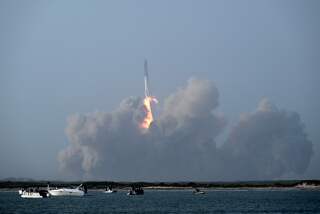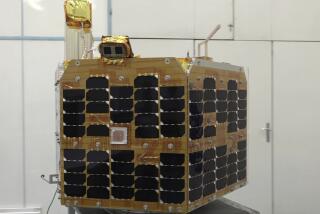Spacecraft Launches and Inflates as Planned
- Share via
An experimental unmanned spacecraft bankrolled by a real estate magnate rocketed into orbit Wednesday and successfully inflated itself in a test of technology that could be used to build a commercial space station.
The Genesis I satellite “successfully expanded,” Robert Bigelow said in a statement posted on his website. The satellite flew aboard a converted Cold War ballistic missile from Russia’s southern Ural Mountains at 6:53 p.m. Moscow time. It was about 320 miles above Earth minutes after launch, the Russian Strategic Missile Forces said.
Mission controllers established contact with Genesis about seven hours after launch.
The launch was a first for start-up Bigelow Aerospace, founded by Bigelow, who also owns the Budget Suites of America hotel chain. Bigelow is among several entrepreneurs who envision a manned commercial spaceflight industry.
Bigelow hopes to use inflation technology to build an expandable orbital outpost made up of several Genesis-like modules strung together like sausage links that could serve as a space hotel, a science lab or even a sports arena.
“We’re ecstatic. We’re just elated,” Bigelow said from Las Vegas. “We have a sense of being on a great adventure.”
Bigelow has committed $500 million toward building a commercial space station by 2015. So far, $75 million has been spent on the project.
Bigelow said before the launch that he was prepared for problems. “I wouldn’t be the least bit surprised if we have a number of different systems fail,” he said. “I would hope that we have some success.”
More to Read
Sign up for Essential California
The most important California stories and recommendations in your inbox every morning.
You may occasionally receive promotional content from the Los Angeles Times.










